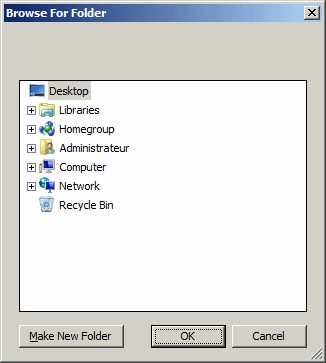|
|
Microsoft Windows provides many dialog boxes useful for
tasks that involve files, such as letting the user browse the hard drive to
select a folder. This can be done using the Browse For Folder dialog box:
|

|
Creating a Browse for Folder Dialog Box
|
|
To help you create a Browse For Folder dialog box,
Microsoft Windows provides a function named SHBrowseForFolder. Its
syntax is:
PIDLIST_ABSOLUTE SHBrowseForFolder(LPBROWSEINFO lpbi);
This function takes one argument that is an object of
type BROWSEINFO. This object is defined as:
typedef struct _browseinfo {
HWND hwndOwner;
PCIDLIST_ABSOLUTE pidlRoot;
LPTSTR pszDisplayName;
LPCTSTR lpszTitle;
UINT ulFlags;
BFFCALLBACK lpfn;
LPARAM lParam;
int iImage;
} BROWSEINFO, *PBROWSEINFO, *LPBROWSEINFO;
Here is an example of calling the
SHBrowseForFolder() function:
//---------------------------------------------------------------------------
#include <vcl.h>
#include <Shlobj.h>
#pragma hdrstop
#include "Unit1.h"
//---------------------------------------------------------------------------
#pragma package(smart_init)
#pragma resource "*.dfm"
TForm1 *Form1;
//---------------------------------------------------------------------------
__fastcall TForm1::TForm1(TComponent* Owner)
: TForm(Owner)
{
}
//---------------------------------------------------------------------------
void __fastcall TForm1::mnuFileOpenClick(TObject *Sender)
{
BROWSEINFO bi;
bi.hwndOwner = Handle;
bi.lpszTitle = "Select a Directory";
SHBrowseForFolder(&bi);
}
//---------------------------------------------------------------------------
After using the Browse For Folder dialog box, if the
user clicks Cancel or presses Esc, whatever change was made would be
dismissed and the function would return false. If the user clicks OK or
presses Enter, the function returns a PIDLIST_ABSOLUTE
object. That object holds all the necessary information about the
selection the user made.